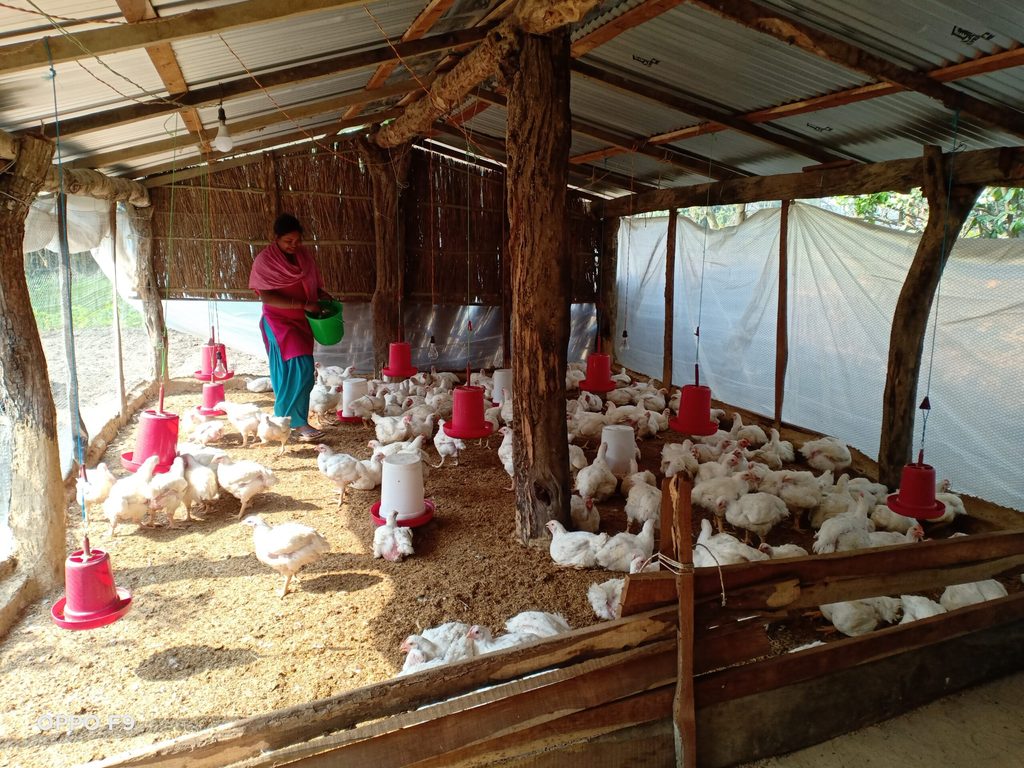Married early, now a budding business entrepreneur
Despite being married at 17, Uma now runs a successful chicken farm following vocational training and support.

Uma’s world started to fall apart after she got married at the age of 17. Although it was a love match and both Uma and her boyfriend mutually decided to elope to get married, neither of them fully understood the consequences they would face by marrying so young.
“I am overwhelmed by the household chores. I do not have time to even breathe as I live in a family of 8 people,” says Uma who is from Bardiya District in Nepal. “I married my husband to escape from my own family situation, expecting things would be better, but I had to stop my education.”
Now 22, Uma is a mother to a 5-year-old son and lives with her in-laws. The family is solely dependent upon a small plot of land where they grow seasonal crops, however, they are unable to produce enough to support them for the whole year as the farm is near a national park and wildlife often encroach onto their land and eat their crops.
Uma’s husband was not able to finish his education and has no skills training, so he works away from home as a manual labourer, sending back what little he earns to help the family. Despite this, the family still finds it hard to get by. “It’s a daily struggle to feed the whole family and we often suffer from hunger,” says Uma.
Although education is free in Nepal, the cost of paying for uniforms and school supplies can be a huge burden for families living on a low income. “We do not have enough money to pay for clothing, stationery, and uniforms for our children,” Uma says. “I am worried about our children’s future. They should not drop out of school because of our family’s economic situation.”
Skills training provides new opportunities
To help young women without any skills or training, vocational training classes teach them the skills they need to earn an income. Uma chose to learn poultry farming and joined a 7-day training course where she was taught the technical skills of rearing and looking after chickens, including dealing with illnesses.
“I learned how to run a business, make a profit, and manage finances. I was shown how to design a business plan which supported me when I started my business and to invest the profits to scale up the business,” Uma explains.
Following the training, Uma received a start-up package that included animal feed, feeding equipment, water pots, fans, medicine, a generator, and 250 chicks. “As well as from everything provided, I bought the materials needed to build a shed on credit from a local shop.”
At first, Uma was disheartened when 20 of the chicks died, even though they were receiving good care and attention, but the remaining chicks did well and grew into healthy chickens which she was able to sell at a good profit.
“I learned how to run a business, make a profit and manage finances.”
Uma
“I was lucky enough to sell a total of 230 chickens weighing 2kg each, making me a profit of NPR 30,000-35,000 (€200-250),” she says, explaining that she used some of her earnings to pay her debt to the store for the shed materials and buy more chicks to raise. “At the moment, I have 380 baby chickens that I have been raising for 10 days now.”
Uma says that her family has been very supportive of her business venture so far. “My in-laws encourage me and I am happy to be able to contribute to my family. Even my husband tells me to continue this business.”
Awareness of Uma’s chicken business has grown in her community and now the villagers come to her directly when they want to buy chicken meat. “My neighbours now have easy access to meat locally produced. They do not have to waste their time going to the market.”
Local buyers and meat sellers have also started contacting Uma directly to supply them with chickens which are in high demand. She is hopeful that her farm can explore more opportunities with dealers to scale up her business.
To do this, Uma explains she is saving a significant amount of money each month. “This poultry farm is being run on a small scale now, but as time passes, I will scale up the farm to a huge business.”
About the project
The Child, Not Bride project is a 4-year, multi-sectoral approach, run by Plan International with funding from the Norwegian State Broadcast Corporation (NRK Telethon). The project develops youth leadership, strengthens livelihood opportunities, and raises awareness of sexual and reproductive health and rights among girls and young people aged 13-24, to combat child, early, and forced marriage.
The project is being implemented by local partner organisations Bheri Environment Excellence Group (BEE Group) and Aasaman Nepal (ASN). Parents are invited to take part in training sessions to learn about the negative consequences of child early and forced marriage and are provided with training opportunities to lift themselves out of poverty.
Categories: Protection from violence, Sexual and reproductive health and rights, Skills and work


